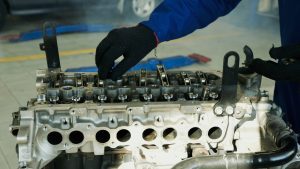auto diagnostics Houston tx
If you’re in Houston, TX, and are experiencing issues with your car or vehicle, then auto diagnostics can help pinpoint the problem areas. Auto diagnostics involves a diagnostic test that is performed by an automotive technician or mechanic to determine what’s wrong with your vehicle’s engine or other components. This service is essential for any vehicle owner who wants to keep their car operating at peak performance.
The diagnostic process usually involves the use of a computer to scan the onboard sensors in the vehicle’s engine and other systems. This process can reveal issues such as a loose gas cap, acceleration problems, or strange noises coming from the engine or other parts of the vehicle. Once the problem is pinpointed, the technician can perform the necessary repairs, such as fixing the brakes, transmission, alternator, or fuel system.
Process Of Auto Diagnostic Houston, TX
Auto body repair offers a full range of auto diagnostics and repair services for domestic and Asian vehicles. certified technicians use the latest diagnostic equipment to accurately diagnose your vehicle’s issues and perform the necessary repairs to get you back on the road. We also provide tire and battery services, as well as other maintenance and repair jobs at reasonable prices.
If you suspect that something is wrong with your car, don’t hesitate to bring it to body shop repair for a diagnostic test. for diagnosing your vehicle’s issues and providing you with the peace of mind that comes with knowing that your vehicle is functioning correctly. Whether it’s a dashboard warning light, an engine temperature light, or any other issue with your vehicle, auto repair experts are here to help.

Top Signs of Car Trouble
Cars are complex machines, and even with proper maintenance, they can experience problems. To keep your car running smoothly, it’s important to be aware of the top signs of car trouble. Here are some common warning signs that indicate your car may need attention:
- Check Engine Light: If the Check Engine Light is on, it’s a sign that there’s an issue with the car’s onboard diagnostic system. It could be something minor like a loose gas cap or something more serious like a malfunctioning sensor. It’s important to have the car checked as soon as possible to avoid further damage.
- Strange Noises: Unusual noises coming from the engine or other parts of the car can be a sign of trouble. For example, a whining sound from the engine could indicate a problem with the alternator, while a grinding noise when you apply the brakes could mean that the brake pads need to be replaced.
- Vibrations: If you feel vibrations in the steering wheel or while driving, it could be a sign of an alignment issue, tire problems, or worn suspension components.
- Difficulty Starting: If your car is having trouble starting, it could be a sign of a weak battery, faulty starter, or other electrical issues.
- Poor Performance: A lack of power or sluggish acceleration could indicate a clogged fuel filter, a failing transmission, or other issues.
- Warning Lights: Warning lights on the dashboard, such as the battery light or the oil pressure light, should never be ignored. They indicate that there’s a problem that needs to be addressed.
If you notice any of these signs, it’s important to take your car to a mechanic as soon as possible. Delaying repairs can lead to more significant and expensive problems down the road. A qualified technician can diagnose the issue and provide the necessary repairs to get your car back to optimal performance.
Check Engine Light Repair
The Check Engine Light is a warning sign that something is wrong with your vehicle’s onboard diagnostic system. It could be something as simple as a loose gas cap or something more serious like a malfunctioning sensor. To resolve the issue, you’ll need to have your vehicle’s computer system scanned to determine the cause of the problem. Once the issue is diagnosed, the necessary repairs can be made to turn off the Check Engine Light and restore your car’s performance. It’s essential to address the issue promptly to avoid further damage and potential safety hazards.

Importance Of A Car Diagnostic Test
A car diagnostic test is essential for detecting issues with a vehicle’s engine and other systems. It involves using specialized equipment to scan the car’s onboard computer system and retrieve any stored error codes. A diagnostic test can identify problems such as a malfunctioning sensor, faulty brakes, or issues with the transmission or fuel system.
By performing a diagnostic test, you can pinpoint the problem areas accurately, preventing unnecessary repairs and potential safety hazards. It can also help you avoid costly breakdowns by identifying potential issues before they become severe. Regular diagnostic tests can ensure that your car runs smoothly and efficiently, extending its lifespan and improving its overall performance.
Engine Temperature Warning
The engine temperature warning light is an indication that your car’s engine is overheating. When this light comes on, it means that the engine has exceeded its maximum operating temperature, which can cause serious damage to the engine components.
The reasons for engine overheating can vary, including low coolant levels, a malfunctioning thermostat, a faulty water pump, or a blocked radiator. It’s essential to take action immediately when the engine temperature warning light comes on, as continued driving can cause irreparable damage to the engine.
To prevent engine overheating, it’s important to keep up with regular maintenance and inspections of the cooling system. This includes checking the coolant levels, replacing the thermostat as needed, and flushing the cooling system periodically. If the engine temperature warning light comes on, pull over immediately and let the engine cool down before attempting to drive again.
How to Keep Your Engine Working Effectively?
To keep your engine working effectively, you should follow these tips:
- Regular maintenance: Follow the manufacturer’s recommended maintenance schedule for your vehicle, including oil changes, air filter replacements, and tune-ups. This can help keep your engine running smoothly and prevent major issues.
- Use the right fuel: Use the type of fuel recommended for your vehicle. Using a lower-grade fuel than recommended can cause engine knocking and other issues.
- Check fluids regularly: Keep an eye on your vehicle’s oil, coolant, and other fluid levels to ensure they’re at the proper levels. Low levels can cause damage to the engine and other systems.
- Drive carefully: Avoid sudden acceleration and braking, which can put unnecessary stress on the engine. Follow speed limits and avoid overloading your vehicle.
- Park in a shaded area: Parking in a shaded area can help prevent your engine from overheating during hot weather.
- Replace worn parts: Replace worn engine parts, such as belts and hoses, before they fail to prevent further damage to the engine.
By following these tips, you can help keep your engine working effectively and extend its lifespan.
Battery Alert Light
The battery alert light is an indication that your vehicle’s charging system is not functioning correctly. This warning light can appear as a battery-shaped symbol on the dashboard and can mean that the battery is not charging, or that there is an issue with the alternator or other components of the charging system.
If the battery alert light comes on, it’s essential to address the issue promptly. Ignoring the issue can lead to a dead battery and potentially leave you stranded. A qualified technician can diagnose the issue with the charging system and perform the necessary repairs to get your vehicle back on the road.
Regular maintenance, such as keeping the battery and terminals clean and checking the alternator belt for signs of wear, can help prevent issues with the charging system. If you notice the battery alert light is on, it’s crucial to get your vehicle checked as soon as possible to avoid further damage and potential safety hazards.





